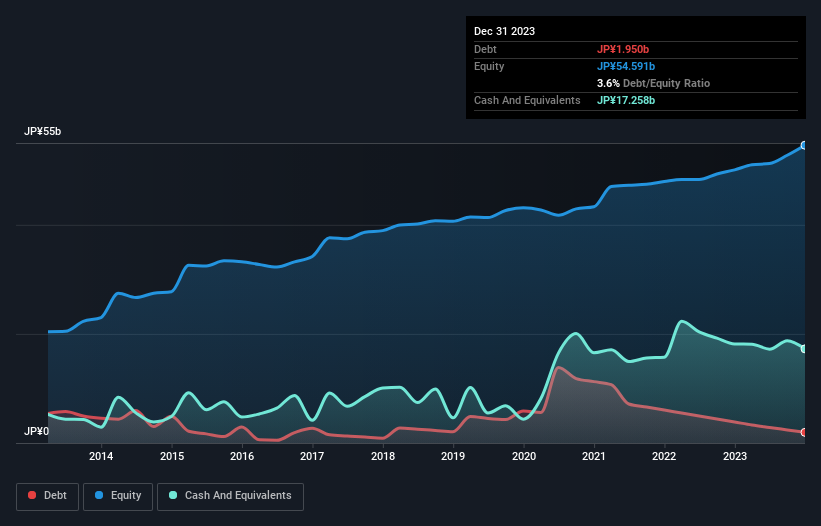
Warren Buffett famously said, 'Volatility is far from synonymous with risk.' So it might be obvious that you need to consider debt, when you think about how risky any given stock is, because too much debt can sink a company. We can see that Nissan Tokyo Sales Holdings Co., Ltd. (TSE:8291) does use debt in its business. But should shareholders be worried about its use of debt?
Why Does Debt Bring Risk?
Debt assists a business until the business has trouble paying it off, either with new capital or with free cash flow. Ultimately, if the company can't fulfill its legal obligations to repay debt, shareholders could walk away with nothing. While that is not too common, we often do see indebted companies permanently diluting shareholders because lenders force them to raise capital at a distressed price. Having said that, the most common situation is where a company manages its debt reasonably well - and to its own advantage. The first thing to do when considering how much debt a business uses is to look at its cash and debt together.
View our latest analysis for Nissan Tokyo Sales Holdings
How Much Debt Does Nissan Tokyo Sales Holdings Carry?
You can click the graphic below for the historical numbers, but it shows that Nissan Tokyo Sales Holdings had JP¥1.95b of debt in December 2023, down from JP¥3.85b, one year before. But it also has JP¥17.3b in cash to offset that, meaning it has JP¥15.3b net cash.

How Strong Is Nissan Tokyo Sales Holdings' Balance Sheet?
The latest balance sheet data shows that Nissan Tokyo Sales Holdings had liabilities of JP¥23.2b due within a year, and liabilities of JP¥7.94b falling due after that. On the other hand, it had cash of JP¥17.3b and JP¥2.50b worth of receivables due within a year. So its liabilities total JP¥11.4b more than the combination of its cash and short-term receivables.
While this might seem like a lot, it is not so bad since Nissan Tokyo Sales Holdings has a market capitalization of JP¥38.2b, and so it could probably strengthen its balance sheet by raising capital if it needed to. But we definitely want to keep our eyes open to indications that its debt is bringing too much risk. Despite its noteworthy liabilities, Nissan Tokyo Sales Holdings boasts net cash, so it's fair to say it does not have a heavy debt load!
Also positive, Nissan Tokyo Sales Holdings grew its EBIT by 28% in the last year, and that should make it easier to pay down debt, going forward. There's no doubt that we learn most about debt from the balance sheet. But it is Nissan Tokyo Sales Holdings's earnings that will influence how the balance sheet holds up in the future. So if you're keen to discover more about its earnings, it might be worth checking out this graph of its long term earnings trend.
But our final consideration is also important, because a company cannot pay debt with paper profits; it needs cold hard cash. While Nissan Tokyo Sales Holdings has net cash on its balance sheet, it's still worth taking a look at its ability to convert earnings before interest and tax (EBIT) to free cash flow, to help us understand how quickly it is building (or eroding) that cash balance. Over the most recent three years, Nissan Tokyo Sales Holdings recorded free cash flow worth 54% of its EBIT, which is around normal, given free cash flow excludes interest and tax. This cold hard cash means it can reduce its debt when it wants to.
Summing Up
While Nissan Tokyo Sales Holdings does have more liabilities than liquid assets, it also has net cash of JP¥15.3b. And we liked the look of last year's 28% year-on-year EBIT growth. So is Nissan Tokyo Sales Holdings's debt a risk? It doesn't seem so to us. There's no doubt that we learn most about debt from the balance sheet. But ultimately, every company can contain risks that exist outside of the balance sheet. Case in point: We've spotted 2 warning signs for Nissan Tokyo Sales Holdings you should be aware of.
If you're interested in investing in businesses that can grow profits without the burden of debt, then check out this free list of growing businesses that have net cash on the balance sheet.
Valuation is complex, but we're here to simplify it.
Discover if Nissan Tokyo Sales Holdings might be undervalued or overvalued with our detailed analysis, featuring fair value estimates, potential risks, dividends, insider trades, and its financial condition.
Access Free AnalysisHave feedback on this article? Concerned about the content? Get in touch with us directly. Alternatively, email editorial-team (at) simplywallst.com.
This article by Simply Wall St is general in nature. We provide commentary based on historical data and analyst forecasts only using an unbiased methodology and our articles are not intended to be financial advice. It does not constitute a recommendation to buy or sell any stock, and does not take account of your objectives, or your financial situation. We aim to bring you long-term focused analysis driven by fundamental data. Note that our analysis may not factor in the latest price-sensitive company announcements or qualitative material. Simply Wall St has no position in any stocks mentioned.
About TSE:8291
Nissan Tokyo Sales Holdings
Engages in the automobile dealership business in Japan.
Flawless balance sheet with proven track record and pays a dividend.

